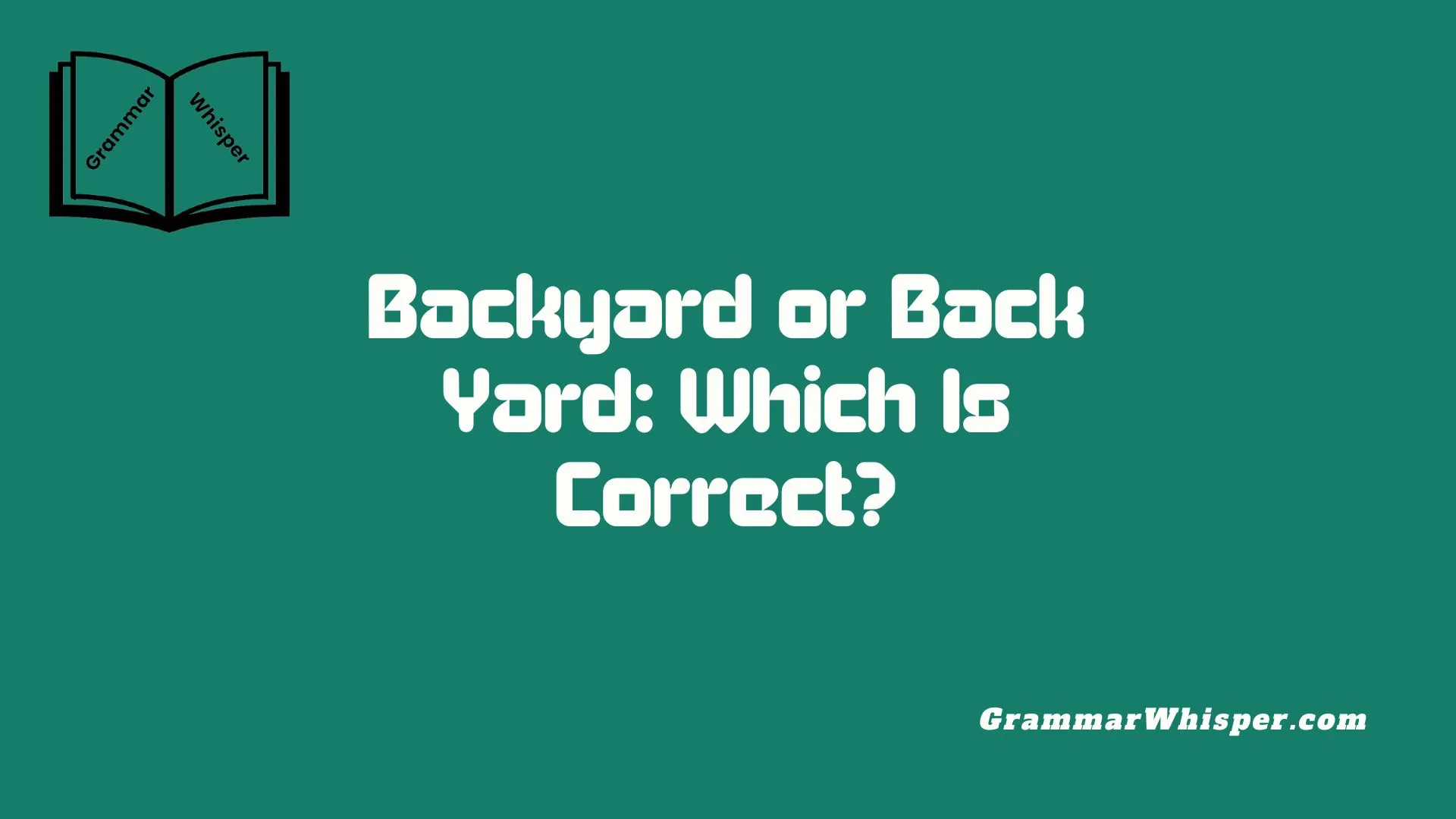In English, the language most of us use daily, there are countless little surprises that sneak into even the most routine writing. One that always sparks discussion is the debated difference between Backyard or Back Yard. I’ve noticed this while editing articles and garden features – writers often switch between the two without realizing that each form can mean something slightly different. While writing about outdoor spaces, the version you choose depends on context. Choosing the correct one isn’t just a matter of spelling; it’s about setting the right tone and being clear to your reader.
What makes it even more interesting is how grammar and geography influence that choice. In American English, people tend to use “backyard” as a single, compound word, while “back yard” highlights the physical yard behind a home. Different editorial guides favor one over the other, but what really matters is clarity and confidence in your writing. Mastering this small but meaningful distinction helps you fine-tune your voice and write with precision. It’s one of those nuanced details that, once understood, shows just how flexible and layered the language can be.
Understanding the Spelling Split: Backyard vs Back Yard
The difference between “backyard” and “back yard” might seem subtle, but it’s important. They’re both valid phrases in English, but they serve different grammatical roles:
- “Backyard” (one word) is usually an adjective: We’re hosting a backyard party.
- “Back yard” (two words) is typically a noun phrase: The kids are playing in the back yard.
In short, use “backyard” to describe something, and use “back yard” to name the space itself.
Example Usage Table
| Form | Part of Speech | Example |
| backyard | Adjective | They built a backyard garden. |
| back yard | Noun phrase | He mowed the back yard today. |
Language Evolution and Compound Word Formation
Like many compound words in English, “backyard” evolved over time. Words such as “toothbrush,” “football,” and “website” began as separate words and were eventually fused as their usage became more common.
Historically, “back yard” appeared more often in older texts. As suburban living and property development increased, the compound “backyard” became a more common descriptor.
Common Compound Word Progression
| Original Form | Transition | Modern Usage |
| back yard | back-yard | backyard |
| web site | web-site | website |
| mail box | mail-box | mailbox |
As society changes, so does language. Dictionaries and usage guides play a crucial role in standardizing these changes.
The Grammar Behind It: Part of Speech Makes a Difference
Understanding part of speech is key to using “backyard” or “back yard” correctly. Here’s the breakdown:
- Use “backyard” as an adjective before a noun: backyard barbecue, backyard fence, backyard renovation.
- Use “back yard” when referring to the space behind a house: He sat in the back yard and read a book.
Grammar purists argue for the separation based on function, and this distinction is supported by editors and educators alike.
Quick Grammar Guide
| Phrase | Use Case | Sentence Example |
| backyard party | Adjective + noun | We enjoyed a relaxing backyard party. |
| back yard | Noun phrase | The cat ran through the back yard. |
Real-World Usage: What Do Style Guides and Editors Prefer?
Leading style guides have their preferences, but they also acknowledge that both forms are acceptable depending on the sentence.
Style Guide Preferences Table
| Style Guide | Preferred Form | Notes |
| AP Stylebook | backyard | One word in most cases |
| Chicago Manual of Style | depends | Use context to guide decision |
| Oxford English Dictionary | back yard | British English usage leans toward two words |
For journalistic writing, “backyard” is usually preferred for brevity. Academic and formal writing may take a more conservative stance and stick with “back yard” when functioning as a noun.
Regional English Variations in Spelling Preference
Just like “color” and “colour,” spelling preferences vary by region:
- American English: “backyard” is the dominant form in both speech and writing.
- British English: More likely to use “back yard” as two words.
- Canadian English: Accepts both, but tends to lean American in casual writing.
- Australian English: Favors the two-word version in traditional print.
Google Ngram Data: Frequency Over Time
A study of Google Books Ngram Viewer shows that:
- In the U.S., “backyard” began to rise steadily in popularity from the 1940s.
- In the U.K., “back yard” remained dominant until the 1990s.
Tech, Media, and SEO: Modern Usage Trends
Digital platforms, blogs, and content marketing have given rise to simplified, shorter spellings. “Backyard” ranks higher in SEO because it matches user search behavior.
SEO Snapshot
| Search Term | Monthly Searches (U.S.) | CPC (Cost Per Click) | Difficulty (SEO Score) |
| backyard | 90,500 | $1.25 | Medium (56) |
| back yard | 2,400 | $0.75 | Low (32) |
Bloggers, influencers, and marketers typically default to “backyard” for better reach.
When Precision Matters: Professional and Legal Writing
In fields like real estate, urban planning, and legal documentation, spelling should reflect precision. Here’s why:
- “Back yard” is used in zoning laws, survey maps, and construction blueprints.
- “Backyard” might appear in marketing materials, but it’s not the legal term.
Case Example
In a California zoning dispute, a property owner used “backyard” in their appeal documents. The judge sided with city planning, noting that “back yard” was the correct term in official ordinances. Legal context matters.
Visual Guide: When to Use “Backyard” and “Back Yard”
Here’s a simple way to remember the difference:
| Use This Form | When It Describes… | Example |
| backyard | An activity or object (adjective) | backyard chickens, backyard pond |
| back yard | A space or location (noun) | in the back yard, through the back yard gate |
This visual format helps writers and students alike memorize usage without overthinking it.
Common Mistakes and How to Avoid Them
Even experienced writers make mistakes with “backyard” vs. “back yard.”
Top Errors
- Using “backyard” as a noun: Incorrect: I played in the backyard. (Should be “back yard”)
- Mixing forms in the same sentence: We had a backyard cookout in the back yard. (Technically OK, but stylistically clunky)
How to Fix Them
- Ask: Is it describing or naming?
- Use grammar-check tools like Grammarly or Hemingway
- Double-check with dictionaries and corpora (Merriam-Webster, Oxford, Google Ngram)
How to Remember the Difference Easily
Let’s make it simple with mnemonics and analogies:
- “Compound tools go in the backyard” (describing)
- “You play in the back yard” (naming the location)
If it helps, think of how you use similar words:
- “Bedroom” (noun) vs. “bed room” (rare, usually incorrect)
- “Football field” = a field for football (like back yard)
- “Football team” = a team that plays football (like backyard BBQ)
Practice Sentences
Try these to test your understanding:
- They planted herbs in the backyard garden.
- She watched the dog run through the back yard.
- We hosted a backyard movie night.
- He cleared the weeds from the back yard fence.
Final Thoughts
Language evolves with use. While both “backyard” and “back yard” are grammatically correct, the choice depends on clarity, style, audience, and function. Writers, editors, marketers, and students should choose based on the message they’re trying to convey.
And remember: language rules exist to serve communication. Let your context guide your spelling.
FAQs
What is the correct spelling: backyard or back yard?
Both spellings are grammatically correct, but “backyard” is the more common form in American English when used as a noun (e.g., “We hosted a barbecue in the backyard”). On the other hand, “back yard” is preferred when used descriptively in a compound phrase (e.g., “The back yard gate was open”).
Is ‘backyard’ one word in British English?
In British English, both forms exist, but “back garden” is more commonly used than either “backyard” or “back yard.” When British publications do use it, “back yard” as two words tends to be the more frequent spelling.
How do I know when to use ‘backyard’ versus ‘back yard’?
Use “backyard” when referring to a place or noun (“The kids are playing in the backyard”). Use “back yard” when it’s used adjectivally or to modify another noun (“Our back yard fence needs repair”). Context and sentence structure determine the correct form.
Has the use of ‘backyard’ increased in recent years?
Yes. According to data from Google Ngram Viewer, the usage of “backyard” has steadily increased in American publications since the mid-20th century. This trend reflects a shift toward more compact spelling in modern writing.
Is ‘backyard’ considered informal language?
No, “backyard” is widely accepted in both formal and informal writing. It appears in official documents, news articles, academic discussions (especially on urban planning and environmental issues), and everyday conversation.











